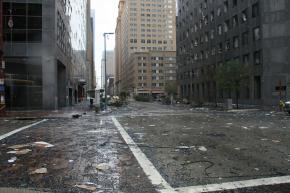Scapegoated after the storm
explains that the blame-the-victim game was underway long before Hurricane Ike hit.
HURRICANE IKE blasted into the Texas and Louisiana coastline late last week and left a trail of destruction, with the estimated death toll reaching over 30 people.
Thousands are homeless, millions are without power, and the full extent of the damage is yet to be determined. Yet before the storm even made landfall, the blame-the-victim game had begun. This is nothing new, but it seems to have intensified since Hurricane Katrina hit New Orleans in 2005.
I grew up in Galveston, the Texas town that took the full force of Ike. Storms like this are not unknown to residents of the island. To date, the worst natural disaster in U.S. history is the 1900 storm that struck Galveston and killed somewhere between 6,000 and 12,000 people.
What's new is the sheer viciousness of the government--from the federal level, down to the municipal--and the corporate media in blaming those who lose everything for their own misfortune.
As Ike approached, a mandatory evacuation for parts of Galveston was issued. City officials made it clear that anyone who stayed had only themselves to blame if they needed help, got stranded or died. This mantra of "we told you so" has continued and intensified since the storm hit.

Before Ike made landfall, reports were coming in that 40 percent of Galveston residents had not left. Perhaps they remembered the hellish experience of trying to evacuate for Hurricane Rita three years ago. This was not long after Katrina struck New Orleans, and the Federal Emergency Management Agency (FEMA) and the Bush administration were feeling the heat for their criminal behavior in that storm. So millions were required to evacuate Galveston and Houston.
Friends of mine in Galveston told me they spent over 20 hours making the drive inland up to Austin (what's normally a three-and-a-half-hour drive). Over 100 people died in the evacuation. This was far more than the seven who died in the storm itself.
Or maybe some of the people who stayed were immigrants, who feared what would happen to them if they encountered police or other law enforcement agents, such as Immigration and Customs Enforcement (ICE). At a time when getting pulled over for a minor traffic violation can result in deportation, is it any wonder that many immigrants on the Gulf Coast have already stated that they stayed behind to face the storm--preferring their chances with Ike to ICE?
Or perhaps folks just stayed behind because they had nowhere else to go and no way to get there, and decided their best bet was to stay and protect what little that they do have.
Now that the storm has passed, entrance back onto the island is prohibited. So thousands of people who left, with little to no resources and no work, are now told that they can't go home. Damned if you stayed, damned if you left.
We still don't know exactly when or where a storm will hit until it's very close to shore. We do know that, thanks to global warming, the storms are getting worse. And we know that hurricane season comes every year.
Any sane society (one that actually used resources to meet human needs) would organize real, workable evacuation and return plans, facilities and procedures--not days but years in advance of predictably unpredictable events such as this.
Instead, municipal, state and federal officials go through the motions to cover their own rear ends, and then scapegoat the very people who lost the most. Billions of dollars are poured into war and bailouts for Wall Street CEOs, while the rest of us are left behind and stranded, every bit as much as those now trapped and suffering on Galveston Island.


